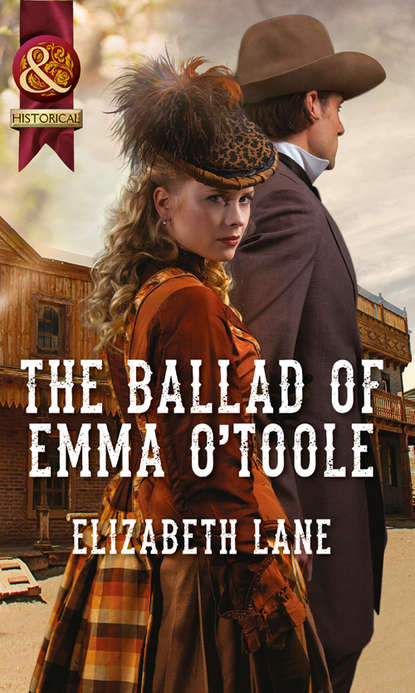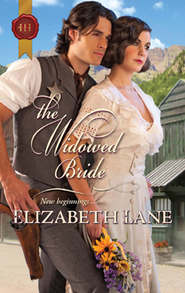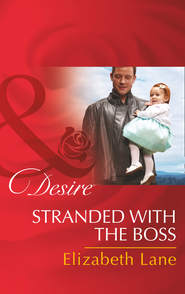По всем вопросам обращайтесь на: info@litportal.ru
(©) 2003-2025.
✖
The Ballad of Emma O'Toole
Настройки чтения
Размер шрифта
Высота строк
Поля
Each and every one of them clutched a fresh copy of the Park Record.
Chapter Two
Emma’s personal belongings, stuffed into an unwashed flour sack, were waiting on the front stoop when she returned to the boardinghouse. Everything she owned was there—her faded gingham work dress; her spare chemise, stockings and threadbare drawers; the rosewood hairbrush that had been her mother’s; and the faded tintype of her father in his captain’s uniform.
From the kitchen at the back of the house, Emma could smell the mutton stew simmering on the cookstove. Her nostrils sucked in the rich, oniony fragrance and her stomach growled as reality crept over her like a winter chill. She didn’t know where her next meal was coming from. She had no money, no food and no place to go except the tumbledown miner’s shanty where Billy John had worked his claim.
She did have friends—mostly hired girls like herself, or former schoolmates who’d married miners. They would give her sympathy, but none of them could afford to take her in. They were as poor as she was.
For an anguished moment, Emma hesitated on the stoop, torn between pride and need. Maybe it wasn’t too late. She could pound on the door until Vi opened it, then fling herself on the old woman’s mercy. She could weep and plead and promise.
But trying the door would only bring her a needless tongue-lashing. Vi Clawson had the Record delivered for her boarders every morning. She had, no doubt, read Hector Armitage’s story and acted on her own grim principles. The sinner had been cast out. No amount of pleading would change Vi’s mind about that.
Clutching her bundled possessions, Emma turned away from the boardinghouse and trudged back down the road. The grim pounding of the Marsac Mill paced her steps like the cadence of a dirge.
She remembered her mother, how the good woman had been left widowed and destitute with a young daughter to raise. She’d taken any work she could find, and that included scrubbing floors and emptying chamber pots in a whorehouse on Silver Creek Road. But Mariah O’Toole had raised her daughter with solid values. Even now, Emma felt her mother’s comforting presence. Somehow, like Mariah, she would find a way to survive.
Two well-dressed women paused to stare at her from a passing buggy, their breaths fogging the icy spring air. Lifting her chin, Emma willed herself to ignore them. She felt as if she were walking naked through the ankle-deep mud, her secrets bared for the whole town to see, but she was too proud to let it show.
This wasn’t her fault, she reminded herself. If that gambler hadn’t shot Billy John, she wouldn’t be in this awful mess, walking the streets, hungry, penniless and exposed as a ruined woman.
Once more Emma willed her anger to fuel her waning strength. She would rise above this, she vowed. She would keep her mind and heart focused on what really mattered—keeping her word to Billy John, and seeing that the gambler paid for what he’d done.
She’d reached Main Street and was passing outside the open door of a saloon when the twang of a guitar drifted to her ears, with a nasal voice rising above the plaintive tune. Something about the song caught Emma’s attention. With mounting horror, she listened to the words.
On an April night when the stars were out
And the moon shone like a jewel,
Billy John Carter spilled his red, red blood
For love of Emma O’Toole, oh, yes…
For love of Emma O’Toole.
The gambler’s gun was cold, hard steel.
The gambler’s heart was cruel,
A bullet blazed, a young man fell,
The lover of Emma O’Toole, oh, yes…
The lover of Emma O’Toole.
There was more to the song, but Emma didn’t wait to hear it. Snatching her bundle close, she fled for Woodside Gulch and her one last refuge.
Logan slumped on the edge of his bunk as the footsteps of Alan Snedeger, his court-appointed lawyer, faded into silence. Until a few minutes ago, he’d clung to the hope of justice and freedom. Now he could almost feel the hangman’s noose jerking tight around his throat.
You shot the boy, Mr. Devereaux. That is the one indisputable fact in this case. Your best hope would be to plead guilty to second degree murder and throw yourself on the mercy of the court. Otherwise, the prosecution will do their best to see you hang.
Logan’s fists balled in frustration at the memory of the lawyer’s words. He’d hoped, at least, for a public defender who’d give him the benefit of the doubt, and would accept that the gunshot had been an act of defense rather than murder. But even that was too much to expect in this godforsaken hellhole of a mining town.
The mercy of the court! An ugly knot tightened in Logan’s chest as he pondered the realities. With a murder charge proven against him, even a merciful court would lock him away for half a lifetime. Anything, even execution, was preferable to the stinking hell of prison. Mercy of the court be damned! He was going to fight this! He would go free or die!
“So, how are you faring today, Mr. Devereaux?” Logan glanced up to see Hector Armitage grinning at him through the bars like a schoolboy bent on tormenting a caged lion.
“Who let you in here?” Logan growled. “Where’s MacPherson?”
Armitage leaned against the wall, making it clear that he had no plans to leave. “The good deputy is next door at the Satin Garter,” he said, “presumably drinking the whiskey I just paid for.”
Logan bit back an oath. “A waste of good money, Armitage. After that newspaper article, what makes you think I’d give you the time of day, let alone the ammunition to do more damage?”
There was no hint of repentance in the man’s face as he shrugged. “I had a deadline to meet, and you weren’t exactly the soul of courtesy.”
“So you went after that poor fool girl and made a local spectacle of her.”
“A local spectacle? You don’t know the half of it. When the Eastern papers get the story over the wire, the lovely Miss O’Toole will be a national heroine. I even wrote a song about her and passed out copies!” The reporter’s ginger eyes glittered in triumph.
“I heard the damned song from next door,” Logan snarled. “Now, are you going to tell me why you’re here?”
“When I smell a good story, I go after it, and I smell a good story here, with you.”
Logan glared at the wretched little man. “So what is it you want?”
“The story of your life, Mr. Devereaux.” Armitage inched closer to the bars. “Every detail, from the first day you can remember. I want to know what brings a man to this state of depravity and desperation and, I guarantee you, so will every reader in the territory.”
The man clearly had no interest in giving Logan a fair chance to give his explanation of the tragic events. He just wanted more ammunition to continue painting Logan as the villain.
“So what’s in this for me?” Logan mouthed the question, knowing its answer would only deepen his disgust.
“Money, Mr. Devereaux! And plenty of it. Maybe you’ve got a sweetheart of your own, hmm? You’d like a chance to leave her set for life, rather than have her struggle to scrape out a living when you’re gone, wouldn’t you? Or if there’s a child—is there a child? Oh, you may well hang—there’s nothing I can do to prevent that. But this way you could leave something behind.” The reporter’s eyes narrowed calculatingly. “I’ll be wanting exclusive rights, of course. A contract may be in order. And that way, you can designate, for whomever you chose, a percentage of—”
“Go to hell,” Logan interrupted, his voice soft, like the warning hiss of a cougar.
“I beg your pardon?” Armitage blinked.
“You heard me the first time.” Logan stretched out on the bunk, his deliberate yawn masking a heartfelt urge to lunge at the bars, grab the little muckraker by the throat and squeeze the miserable life out of him. “I’m not interested in lining your pockets. If I’m going to hang, I’ll do it with my privacy intact, thank you. I’m certainly not going to give it up for a slimy little scandal-chaser like you.”
“You’re making a grave mistake, Mr. Devereaux. It would be very foolish to drive away a representative of the only paper in town when it’s public opinion that will decide if you live or die.”
“I thought that’s what the trial was for.” Logan’s eyes narrowed to dangerous slits. He watched as the reporter fumbled in his vest pocket and came up with a small white card, which he flipped between the bars.
“Think it over,” he said. “Let me know when you change your mind.”
“I won’t.” Logan lay motionless, contemptuously indifferent. Armitage turned to go, then paused, an impish grin lighting his face.
“Almost forgot—I do have one piece of news for you. They’ve appointed the judge for your trial. Want to know who it is?”











